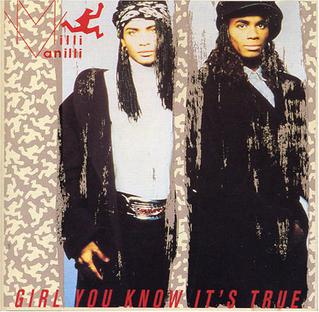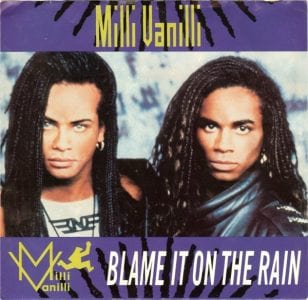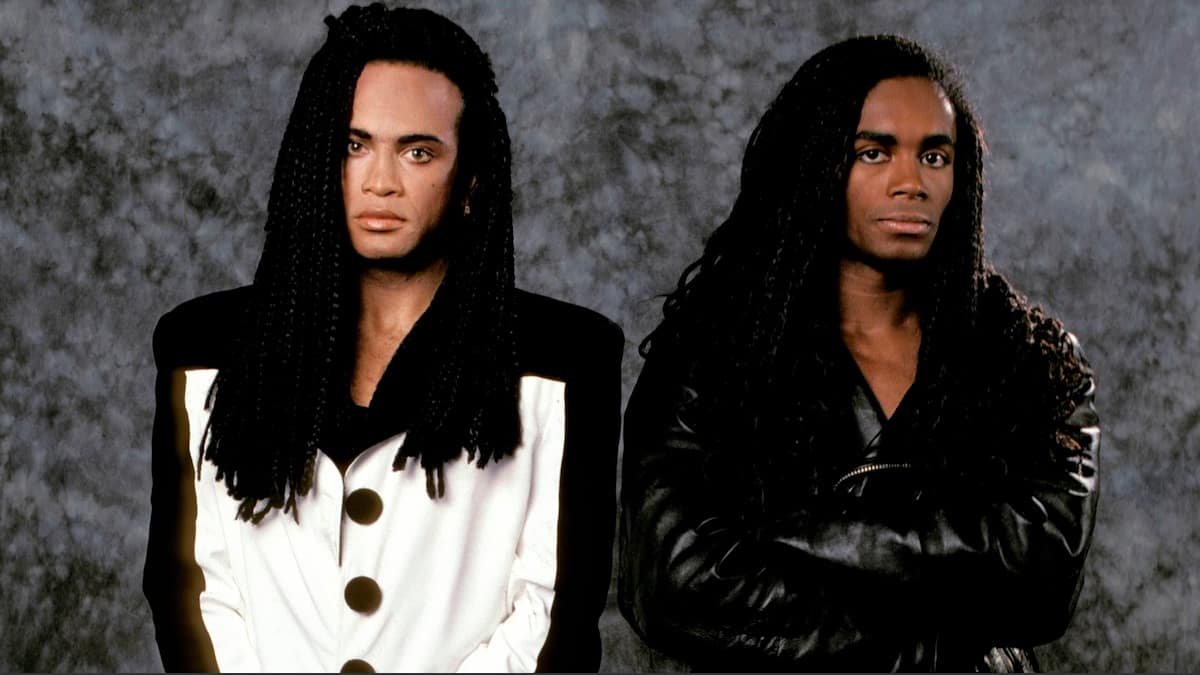Retrospective: 30 Years Since Milli Vanilli

30 years ago, in the summer of 1989, Milli Vanilli was one of the most important musical acts in all of the world. Their debut album, Girl You Know It’s True (All or Nothing internationally) had produced three number one hits in the United States and would go on to sell 7 million copies in the states and over 30 million globally.
It was a major feat for a band that, just a year and a half prior, didn’t really exist at all. Their rocket ride to stardom seemed too good to be true and, as we all know, it indeed was.
Within a few months, the duo would be at the center of a mammoth lip-syncing scandal. They would have their Grammy Award revoked (the only band to have that happen to) and the downward spiral would sadly end in the tragic death of one of the two members.
It’s a sad story that touches on a variety of issues including, most relevant to this site, authenticity in art. It’s also a story that hasn’t really faded in its importance, even as decades have passed.
So today, we’re going to take a look at the Milli Vanilli scandal, what it meant for music and the shadow that it’s cast on art in the digital age.
Girl You Know It’s (Not) True: The Milli Vanilli Scandal
Note: One of the interesting things about the story is that, even 30 years later, there are still many points that are up for debate. In the name of both brevity and accuracy, we’re going to limit the discussion to that which is pretty conclusively understood.

Robert (Rob) Pilatus and Fabrice (Fab) Morvan met sometime in the early 1980s where they became friends, bonding over similar experiences of growing up black in predominantly white European cities. They reunited in Munich, Germany in the later 80s and were working to make their mark as models, dancers, singers or anything they could do.
There they met German music producer Frank Farian who, on January 1, 1988, signed the duo to a contract. He had what he felt was a ready-made hit for them in the song Girl You Know It’s True and set about recording it.
However, according to Pilatus and Morvan, Farian lied and misled them, signing them on as singers but eventually deciding that they didn’t have the talent to become stars and re-recording their songs months later using studio musicians.
Though it is unclear what Pilatus and Morvan knew and when, after the swap out was made they did agree to go along with the scheme, becoming the face of the band and lip-syncing in concerts and other performances.
The album, released as All or Nothing in Europe and Girl You Know It’s True in the United States, became an instant success. It would be certified 6x platinum in the United States and five singles from it would chart, including three number ones.
The narrative many remember (or even hear) is that the entire thing began to fall apart when their background track began to skip during a concert. While this certainly did happen at a concert on July 21, 1989, it was far from the beginning or the end of the story.
Suspicions about Pilatus and Morvan were rife almost from day one. Interviewers would note their limited English skills and that often raised doubts privately about whether they had performed on the albums.
However, the concert itself didn’t actually change much. Those in attendance either didn’t notice the issue or wrote it off as a technical glitch. Proof of this is in the fact that the band continued to have broad success, even winning a Grammy Award for Best New Artist in February 1990. It was only in hindsight that the concert became a larger deal.
In fact, for a time, it seemed nothing could sink the band. In December 1989 Charles Shaw, one of the original singers on the album, came forward and claimed Pilatus and Morvan were not the real vocalists. Farian reportedly paid him $150,000 to retract the statements but the story still fostered doubts in many people’s minds.
Instead, what sank the band was backstage tensions between Farian and the duo. Though the exact nature of the tension is hotly debated, it seems to be a combination of Pilatus’ erratic behavior and the duo’s insistence on singing for the next album.
For Pilatus’ part, he famously gave an interview proclaiming the band the “new Elvis” and comparing themselves favorably to musicians such as Bob Dylan, Paul McCartney and Mick Jagger. Pilatus and Morvan have long denied this saying the quote is taken out of context and owed to the band’s limited understanding of English.

On November 14, 1990, Farian announced that he had fired the duo and that they did not sing on the records. This prompted the LA Times to sit down with Pilatus and Morvan where they admitted they had lied calling the past two years of their lives “Hell”.
This prompted a push from Pilatus and Morvan to prove that they could actually sing, including playing tapes of their performances at press conferences. However, despite making multiple come back attempts under new band names, the duo never found success again.
The case also sparked a class action lawsuit that was eventually settled out of court. Purchasers of the album and attendees of Milli Vanilli concerts being eligible for partial refunds.
Despite all of this, in 1997, the duo reconnected with Farian to try and produce a new Milli Vanilli album with them providing lead vocals. However, Pilatus had increasing personal issues including issues with drugs, alcohol and legal problems. On the eve of a tour to promote the new album, Pilatus was found dead in a hotel room in Frankfurt, Germany, he was 32.
Morvan has continued to push a solo career but has never found anywhere near the success he found in 89-90 as part of Milli Vanilli.
The Era of the Lip-Sync

Though Milli Vanilli is by far the largest lip-syncing scandal from that time period, it’s also far from the only one.
In November 1990, the same month the Milli Vanilli story was coming to a head, the band C+C Music Factory released a single Gonna Make You Sweat (Everybody Dance Now) however, the titular “Everybody Dance Now” line was actually a demo recorded by Martha Wash, who had found success in 1982 as half of The Weather Girls. Instead, the band had a model lip-sync the line for the music video.
Wash sued the band and the label and, in 1994, secured a settlement that ensured she would get proper credit for her vocals moving forward, including requiring an edit to the MTV video.
However C+C wasn’t even the only band to lip-synch Wash’s vocals that year. Also in 1990, Black Box lip-synced her vocals in the music video for the song Everybody Everybody. That case was also settled out of court.
If there was a peak time for lip-syncing in mainstream music, it was almost certainly the late 80s and early 90s. There was no one factor that caused it, it was a combination of trends that combined to make an environment ripe for this kind of fabrication.
- Music Videos: MTV launched in August 1981 but the medium had been largely experimental for much of that time. By the end of the decade, music videos were a big part of the music industry and being taken more seriously, including the desire to feature more attractive performers.
- Music Tastes: The dance music craze that Milli Vanilli, C+C and others rode to success would be short lived. Nirvana would release Nevermind in September 1991 and mainstream music tastes would shift in a big way. Dance music tends to have less emphasis on the people creating it, with many such bands in Europe not even having recurring musicians.
- Technology: Technology at the time was good enough for reliable playback and lip-syncing but not good enough to correct or “fix” mediocre vocals. In 2019, a band like Milli Vanilli would likely have their vocals altered and improved by the producers rather than be re-performed by session musicians. Lip-syncing at concerts was already fairly common then and is even more so today.
But while this may have been peak lip-sync for recorded music, it doesn’t mean that it was tolerated by the audience. Milli Vanilli’s sharp downfall is proof that, even with dance music, audiences like to know who is performing on their music, or at least don’t like being lied to.
For critics of the genre, the scandals just fueled the flames of those claiming the genre was “fake” and “not real music”. To that end, Milli Vanilli didn’t just tank their own career, they hurt an entire genre of music.
But that’s the nature of these types of stories. As we saw more recently with the Crime Junkie story, when a top name in a field gets accused of dishonesty, the damage isn’t limited to them but to similar, less-well-known artists. After all, if Milli Vanilli can fake an entire album, what’s to stop any other act from doing the same?
Milli Vanilli, or perhaps more specifically Farian, eroded trust in the entire genre and mainstream music more broadly. Thirty years later, that mistrust is still present in many ways, with musicians constantly struggling to prove how “real” they are.
And that trend has continued. Though MTV Unplugged began in 1989, predating the worst of the Milli Vanilli fallout, it became a powerful tool for artists to showcase their raw talent. Even today we see Lady Gaga performing acoustic on a piano, isolated vocals and more in a bid to prove that an artist is who they appear to be.
To be clear, this isn’t the fault of Milli Vanilli. Today’s mistrust of musical integrity comes more from technical wizardry than it does lip-syncing. But the era of lip-syncing certainly kicked off this mistrust, or rather, it lended significant credence to the mistrust that was already there.
Milli Vanilli played a major part in that.
Blame it on the Plagiarism?
One of the more interesting elements of the Milli Vanilli story is that, neither while it was going on nor today is it referred to as “plagiarism”.
However, what the band did clearly meets any reasonable definition of plagiarism. They took the creative work of others, namely the vocal performance, and presented it as their own. Even though the international release of the album didn’t expressly list Pilatus and Morvan as the vocalists, the U.S. version did. Farian, Pilatus and Morvan clearly lied about the creator of those vocals.
It isn’t because it was music. If Farian had lifted the composition it would have been decried as plagiarism, just as we do now. It isn’t because the “victims” were willing participants, we consider essay mills and even unethical use of ghostwriters plagiarism.
Instead, it’s likely because we already had a pointed term for it: Lip-syncing.
Lip-syncing, as a behavior, goes back almost as far as recorded music. When done with the audience’s knowledge, it’s even a fun activity and the subject of a TV show. Whether in showers or on stage, it’s something most people have done and it’s seen as harmless fun.
It’s the lie that makes it damaging. When Milli Vanilli came to the world claiming to have sang lead vocals on the album only to have lip-synced their way to stardom, it turned the fun activity into a major fraud.
But, since we had a name for this kind of fraud, it was the name that was used. Even if plagiarism is also apt, it’s a broader catch all term that less-precisely described a very specific kind of misrepresentation.
Bottom Line
The Milli Vanilli story can be interpreted one of two ways: They were either two young, naive men that were exploited by an aggressive producer or willing participants in a scheme to defraud listeners.
What isn’t up for debate is that they paid for it dearly. Their Grammy was revoked, their careers were ruined and their reputation destroyed. They were never going to recover after the scandal came to light.
However, the irony may be that Milli Vanilli was likely just 20-30 years ahead of their time. Today, lip-syncing at concerts and in music videos is common and broadly accepted while audio editing has improved to the point that they likely could have recorded their own tracks and been fine.
This isn’t meant as a comment about music today versus 30+ years ago, but rather a note that the way the industry approaches attractive and talented artists that struggle vocally has changed. Milli Vanilli would have had a much different run in the 2010s than in 1989.
Despite that, Milli Vanilli changed the perception of the music industry and that shift is still visible today. There has always been an inherent mistrust of much of pop music and Milli Vanilli became the rallying cry for those who felt that way.
Even 30 years later, their name is still uttered in that context. While many artists would cherish that kind of longevity in the music business, it’s unlikely that this is what Pilatus and Morvan had in mind.
Want to Reuse or Republish this Content?
If you want to feature this article in your site, classroom or elsewhere, just let us know! We usually grant permission within 24 hours.
